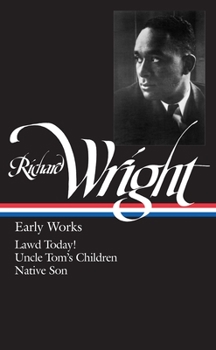Richard Wright: Early Works (Loa #55): Lawd Today! / Uncle Tom's Children / Native Son
Select Format
Select Condition 
Book Overview
Includes Native Son, now an HBO original movie by Rashid Johnson, with a screenplay by Suzan-Lori Parks and starring Ashton Sanders. Native Son exploded on the American literary scene in 1940. The story of Bigger Thomas, a young black man living in the raw, noisy, crowded slums of Chicago's South Side, captured the hopes and yearnings, the pain and rage of black Americans with an unprecedented intensity and vividness. The...
Format:Hardcover
Language:English
ISBN:0940450666
ISBN13:9780940450660
Release Date:October 1991
Publisher:Library of America
Length:936 Pages
Weight:1.43 lbs.
Dimensions:1.2" x 5.2" x 8.1"
Age Range:18 years and up
Grade Range:Postsecondary and higher
Customer Reviews
2 ratings
A Great re-Read!
Published by Thriftbooks.com User , 14 years ago
I read it when it was first published. It was as real to me then, as it is today. I found so much reality in what Wright wrote back then, that I discovered, during this second read, that Charles Wright and I come from the same neck of the woods: and perhaps the train whistle he heard in Mississippi, was the one I heard when I was laboring there, as a three year old, on the Gaines Plantation in the deep Delta. With America's first African American president finally settling in,to his own chilling realities; if you haven't read Native Son, read it and see if Charles Wright would expect any significant changes, for those left behind on the various plantations throughout America., under the new regime. Wright painted a dark picture of Chicago that yet lives today; the politics during his Native Son years are little different today. Slavery seems to have left Mississippi and followed us to Chicago. Nevertheless, one must have courage to confront the truth, whether its your own, or that of Richard Wrights'as depicted in this brilliant collection. If President Obama sends me another stimulus...like he keeps giving to the bankers and major corporate industry cheats, I'll buy copies of Wright's Early Works and send them to every US Senator, and Congressional Rep....in addition to the duly elected officials of the State of Illinois. Get the book. Discuss it with your family members. America may become a better place as a result of your discussions.
Fascinating, Stimulating, Brutally Honest Writing
Published by Thriftbooks.com User , 23 years ago
The Library of America consistently produces wonderful volumes, and Richard Wright's "Early Works" is a strong member of the set. As I worked my way through this volume, I found myself re-thinking questions I have put aside for a while, challenging attitudes that I have acquired as part of our zeitgeist. I did not find that much of interest in "Lawd Today!" and "Uncle Tom's Children," the first two selections in the volume. Perhaps I will take another look at them in the future. However, "Native Son" was a revelation to me, and I found it amazing.As a student of Mississippi literature, as well as a native Mississippian, I am surprised that I had not read "Native Son" before. I wonder what response Wright might expect me (a white Mississippian) to have to his work. The answer is not as simple as one might think. Growing up in Mississippi, I worked as a dishwasher. I ran errands for people who looked down on me and wanted me to act stupid and grateful. I felt the harsh sting of minor capitalists zealously defending their tiny empires. Like Wright, I grew up in a single-parent household with extremely limited resources. Like Wright, I never had a feeling that "the system" wanted to do anything but keep me in my place. Like Wright, I looked around to see that my people were limited by their ignorance and fear. For all of our differences, white and black Mississippians have far more in common than most people want to admit. It is part of what makes us such a fertile field for literature. The easy response for a white person, Mississippian or not, is simply to be reactionary, to allow "Native Son" to confirm easy stereotypes. In "How `Bigger' Was Born," Wright acknowledges that one of the dangers he faced in writing "Native Son" was that those who are pre-disposed to see Bigger as typical of "those people" in general and of blacks in particular would find unequivocal confirmation of their prejudices. Wright must have been constantly tempted to avoid writing with such brutal honesty.However, it is this honesty that forms the core of Wright's artistic achievement and makes his work enduring, almost prophetic. Bigger Thomas represents a type that still exists in plentitude. In "How `Bigger' Was Born," Wright explicitly makes the point that Bigger represents a type that is both black and white, a person growing up in the land of plenty without prospects or hope, without enough education to replace instinct with rational calculation. Unable to participate and without a place, our Biggers simply want to blot out everything and everyone from the face of the earth. Some of them unknowingly follow Bigger's example and kill what they think is killing them.I think I see Bigger every day on the black streets of Atlanta. A close relative of Bigger lives in the white trailer parks in our suburbs. Bigger acts every time a teenager commits a senseless murder, every time a child shoots up a school. I hear an analysis of Bigger wh





